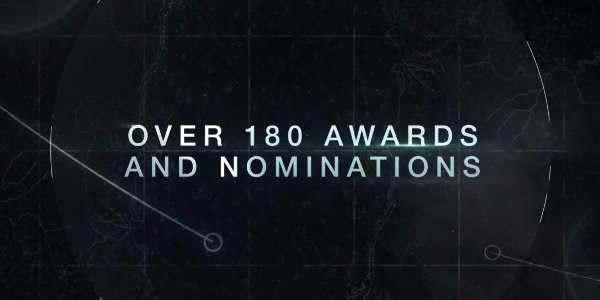
Your Daily Blend of Entertainment News
You are now subscribed
Your newsletter sign-up was successful
Destiny's launch trailer proudly notes that it won 180 awards and nominations prior to its launch. However, the game ended up receiving lukewarm reviews. What happened there?
Games publications have a long tradition of giving out awards to the best games at E3 and conventions. It's easy to see why this has become a standard practice. Everyone wants to be the first to champion the next big thing or that game no one's giving enough attention. There's no stronger way to state your affection than to hand it an award.
I'm not sure that these awards have any benefit to readers, though. When a game racks up dozens of awards before it's even in stores, this only really tells you two things:
1) People think this game won't suck for some reason.
2) The marketing team should get raises.
Make no mistake: winning 180 awards before your game even hits stores is a triumph. However, it's a success belonging to those whose job is hyping that game. The people who create the trailers, determine how the information is rolled out to the public, and decide what the hands-on demos will consist of. Their job is to make sure everything you know about the game prior to launch is positive, and that everything you don't know about the game is a source of hope rather than skepticism.
"We don't know anything about the multiplayer yet," a preview might say. "But if it's anything like the single-player, we're in for a treat!"
Your Daily Blend of Entertainment News
When a game wins an E3 award, what that really means is that it made a great first impression on a publication. We don't know what that first impression actually consisted of, though. The Game Critic Awards, voted on by critics from several different outlets, restrict most of their E3 awards to games with playable demos. They do make exceptions for "special commendations" for graphics, innovation, or sound design though. Other publications may have similar policies, though they rarely spell this out.
Still, even if we know that awards were given based on hands-on previews, then we're still left with questions:
- How long was the demo?
- What features were included in the demo?
- What features were missing?
Because games come in all shapes and sizes, there's no standard length or format for a demo. A demo for Call of Duty: Advanced Warfare could consist of a 20-minute multiplayer match against other E3 attendees while an Assassin's Creed Unity could be a 15-minute mission from the campaign. These small samples from two very different games are then somehow weighed against each other when it comes time to dole out awards. The winner may be determined simply by which studio chose the better slice of their game for the demo.
What makes awards' significance even harder to gauge is that every publication gives out a different amount of awards. GameSpot recognized 15 games from E3 2014. IGN gave out 20 awards, but also announced dozens of runners up or nominees. Game Informer and Polygon doled out 21 awards apiece. Some sites break down their awards by genre or platform, while some don't.
Once these awards are aggregated together by a publisher for their new trailer, all of this meaningful information is stripped out. When Activision says that Destiny won 180 awards or nominations, that total could include a graphics award for a hands-off preview, a Best Shooter award based on a campaign demo, and a nomination in the Best PS4 category for a multiplayer test. Huge honors and participation trophies alike just become part of a pile of 180. It's an impressive number but one without any specific meaning beyond "People had good feelings about our game 180 times."
I understand that sites want to praise games that are shaping up great. It's natural as a gamer to be excited for an upcoming release and to want to share that enthusiasm with their audience. Awards for E3 and other convention showings don't properly communicate a game's worth to consumers, though. Critics' opinions on a game are simply reduced to a tally of accolades without context. Why let your complex feelings on a game get reduced to a mere statistic?
The only beneficiary in this tradition is the publisher, who gets medals and ribbons for their game before it even hits stores. The customer thinks this award sticker means the game is good. However, these accolades say more about the quality of the marketing team rather than the quality of the game.
Staff Writer at CinemaBlend.

